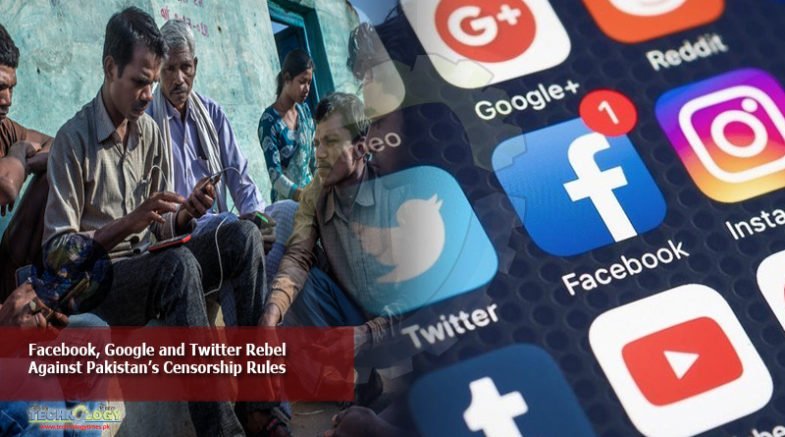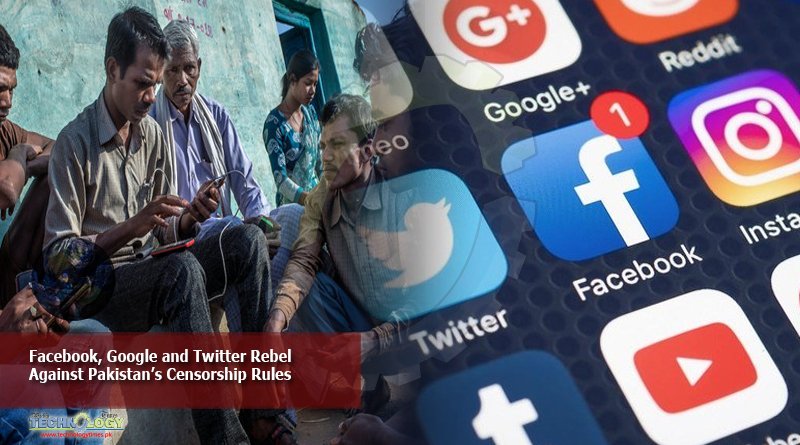The battle is the latest skirmish between internet companies and governments over who decides what content should be online.

MUMBAI, India — When Pakistan’s government unveiled some of the world’s most sweeping rules on internet censorship this month, global internet companies like Facebook, Google and Twitter were expected to comply or face severe penalties — including the potential shutdown of their services.
Instead, the tech giants banded together and threatened to leave the country and its 70 million internet users in digital darkness.
Through a group called the Asia Internet Coalition, they wrote a scathing letter to Pakistan’s prime minister, Imran Khan. In it, the companies warned that “the rules as currently written would make it extremely difficult for AIC Members to make their services available to Pakistani users and businesses.”
Their public rebellion, combined with pressure and lawsuits from local civil libertarians, forced the government to retreat. The law remains on the books, but Pakistani officials pledged this week to review the regulations and undertake an “extensive and broad-based consultation process with all relevant segments of civil society and technology companies.”
“Because Pakistan does not have any law of data protection, international internet firms are reluctant to comply with the rules,” said Usama Khilji, director of Bolo Bhi, an internet rights organization based in Islamabad, the country’s capital.
The standoff over Pakistan’s digital censorship law, which would give regulators the power to demand the takedown of a wide range of content, is the latest skirmish in an escalating global battle. Facebook, Google and other big tech companies, which have long made their own rules about what is allowed on their services, are increasingly tangling with national governments seeking to curtail internet content that they consider harmful, distasteful or simply a threat to their power.
India is expected to unveil new censorship guidelines any day now, including a requirement that encrypted messaging services like WhatsApp tell the government how specific messages moved within their networks. The country has also proposed a new data privacy law that would restrict the activities of tech companies while exempting the government from privacy rules.
The unified resistance by Facebook, Google, Twitter and other tech companies in Pakistan is highly unusual. Companies often protest these types of regulations, but they rarely threaten to actually leave a country. Google pulled its search engine out of China in 2010 rather than submit to government censorship of search results, but LinkedIn agreed to self-censor its content when it entered China in 2014 and Apple acceded to Chinese demands to remove apps that customers had used to bypass the country’s Great Firewall.
A German Mine Hit and the Ship Split in HalfThere’s No Dark Universe Anymore, Just One Monster After AnotherWhy Are American Women Running Faster Than Ever? We Asked Them — Hundreds of Them
Chinmayi Arun, a fellow at the Information Society Project at Yale Law School, said the collective threat by the tech companies to leave Pakistan was a brilliant new tactic to fight authoritarian policies.
“If it was just Google threatening this or Facebook threatening this, Pakistan might say go ahead,” said Ms. Arun, who founded the Center for Communication Governance at National Law University Delhi. “It’s more risky for the Pakistani government to have all of these services withdraw together.”
In Pakistan, like much of the world, Facebook, TikTok, WhatsApp and YouTube routinely top the charts of most popular apps.
Under the new regulations, formally known as the Citizen Protection (Against Online Harm) Rules 2020, social media services must remove or block content within 24 hours of a request from a newly appointed officer, called the national coordinator. Companies must also prevent the live-streaming of any type of content the authorities say is objectionable and label as “false” anything the government deems to be so.
In addition, the companies must open permanent offices in Islamabad and set up servers to store data in the country. Violations of the law are subject to fines of more than $3 million, with the authorities even empowered to block services entirely.
Pakistani officials denied the new regulations were aimed at curbing free speech.
Firdous Ashiq Awan, the adviser to the prime minister on information and broadcasting, said in a policy statement this month that the rules were introduced to protect the social, cultural and religious values of the country.
She added that “under the new laws, action could be taken against those who speak against national institutions and sovereignty” — a veiled reference to the military.
Shahzada Zulfiqar, president of the Pakistan Federal Union of Journalists, urged the government to rescind the regulations, which were adopted without any warning or public consultation.
“The new laws will not only cause deterioration of a digital economic future for Pakistan but also decrease freedom of expression, increase censorship and diminish digital rights,” he said.
The U.S. government also expressed concern about the new restrictions. On Tuesday, the State Department tweeted that they could be a “setback to freedom of expression” and hamper the development of Pakistan’s digital economy.
New restrictions on social media platforms in #Pakistan could be setback to freedom of expression & development of digital econ. Unfortunate if Pakistan discourages foreign investors & stifles domestic innovation in such a dynamic sector. Encourage discussion w/ stakeholders.
Google, Facebook and Twitter declined to comment beyond the letter from the Asia Internet Coalition.
It is a “huge concern” that more governments want to take down online content, said Jennifer Daskal, a law professor at American University and faculty director of its Tech, Law, Security Program. So many of the rules “end up being used by the government to stifle dissent, or to curate content in ways that are conducive to the government’s preferred narratives.”
Mr. Khan rose to power in Pakistan in 2018 partly because of his party’s strong presence on social media, a fact he acknowledges in his speeches. But now that he is in charge, he has shown little patience for online criticism.
Pakistan’s powerful military is also averse to debates on social media platforms, especially on Twitter, which is used by critics to question human rights violations and the military’s involvement in politics.
Over the past two years, Pakistani government requests for Facebook, Google and Twitter to remove content have increased sharply, according to transparency reports published by the companies. Pakistan disclosed in September that it had blocked more than 900,000 web pages for various reasons, including pornography, blasphemy and sentiments against the state and military.
Separately, regulators in Pakistan have proposed requiring online video sites to obtain licenses from the government.
There is a strong case to be made that the government is overstepping its authority with the new rules, said Muhammad Aftab Alam, executive director of the Institute for Research, Advocacy and Development, a Pakistani public policy group.
“This national coordinator is judge, jury, regulator and executioner as well,” he said.
At least two lawsuits challenging the rules have already been brought in Pakistani courts.
“The main objective of the impugned rules seems to be to control the social media through indirect control by the government and ruling party,” read the petition in one case, filed by Raja Ahsan Masood, who asked the court to declare them unconstitutional.
Vindu Goel reported from Mumbai, and Salman Masood from Islamabad, Pakistan. Zia ur-Rehman contributed reporting from Karachi, Pakistan, and Davey Alba from New York.
